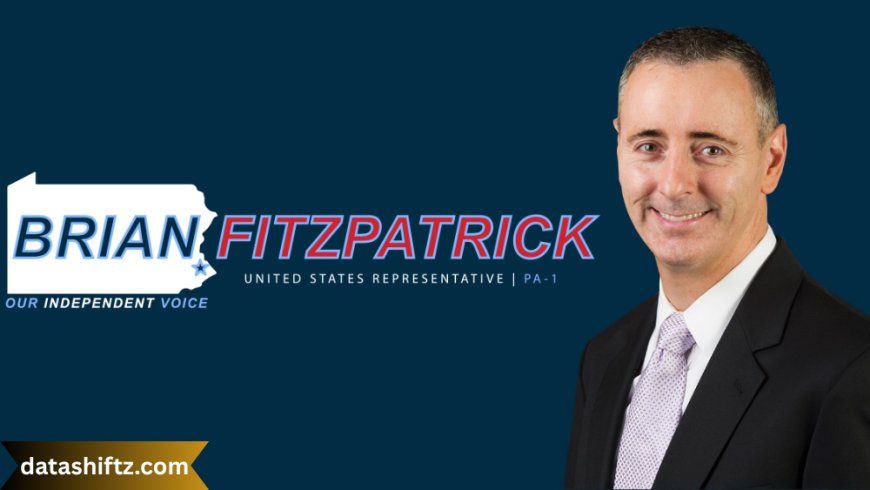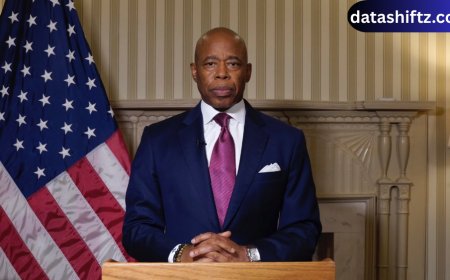Brian Fitzpatrick: A Moderate Voice in American Politics

Introduction
In today’s polarized political climate, voices of moderation and bipartisanship are increasingly rare. One such voice is Brian Fitzpatrick, a Republican U.S. Representative from Pennsylvania known for his independent streak and centrist positions. Representing Pennsylvania's 1st congressional district, Fitzpatrick has gained national attention for voting across party lines, advocating for government reform, and championing causes like infrastructure, national security, and environmental protection.
This article delves into Brian Fitzpatrick’s background, legislative priorities, political philosophy, and the impact he continues to make as a lawmaker who often puts principle over party.
Who Is Brian Fitzpatrick?
Background and Early Career
Brian K. Fitzpatrick was born on December 17, 1973, in Levittown, Pennsylvania. Before entering politics, he built an extensive career in public service, particularly within law enforcement and federal agencies.
He is the younger brother of Michael G. Fitzpatrick, who previously held the same congressional seat. Brian followed in his brother’s footsteps while carving out a unique legacy of his own.
Education and Professional Experience
| Category | Details |
|---|---|
| Education | Bachelor’s from La Salle University, J.D. from Penn State Dickinson Law |
| Early Career | Former FBI Special Agent |
| Federal Experience | Worked on political corruption and terrorism cases; part of FBI’s political corruption unit |
| Bar Admission | Admitted to practice law in Pennsylvania and New Jersey |
| Entry into Politics | Elected to the U.S. House of Representatives in 2016 |
Political Career and Legislative Work
Key Legislative Priorities
Brian Fitzpatrick has served in Congress since 2017, representing a suburban swing district that includes Bucks County and parts of Montgomery County. Because of the moderate leanings of his constituents, Fitzpatrick often takes bipartisan or centrist positions, even when they conflict with mainstream Republican views.
Major Legislative Focus Areas
| Policy Area | Notable Work |
|---|---|
| Government Reform | Supports term limits, anti-corruption laws, and campaign finance reform |
| Healthcare | Advocates for protecting pre-existing conditions, bipartisan healthcare reform |
| Environmental Issues | Co-chair of the Climate Solutions Caucus; supports clean energy initiatives |
| Infrastructure | Backed the Infrastructure Investment and Jobs Act |
| National Security | Focus on counterterrorism and cyber defense |
| Law Enforcement | Strong pro-law enforcement stance rooted in FBI background |
Brian Fitzpatrick’s Bipartisan Credentials
-
Ranked #1 Most Bipartisan Member of the House (as per the Lugar Center)
-
Only Republican to Vote for the George Floyd Justice in Policing Act (in part)
-
Co-Chair of the Problem Solvers Caucus
-
Supports LGBTQ+ protections under the Equality Act
-
Has Voted with Democrats on Gun Control Measures
-
Supported COVID-19 Economic Relief Measures
-
Advocated for Postal Service Protection
-
Backed Ukraine Support Packages Amid Russia Invasion
Fitzpatrick is often praised for prioritizing pragmatic governance over partisanship, making him one of the most independent members of Congress.
Electoral History and Performance
Brian Fitzpatrick has consistently won elections in a competitive district by appealing to moderates, independents, and even some Democrats. His record of bipartisanship is a key factor in his electoral success.
Electoral Performance Overview
| Election Year | Opponent | Party | Result |
|---|---|---|---|
| 2016 | Steve Santarsiero | Democrat | Won by 8 percentage points |
| 2018 | Scott Wallace | Democrat | Narrow win (51.3% to 48.7%) |
| 2020 | Christina Finello | Democrat | Won by over 13 percentage points |
| 2022 | Ashley Ehasz | Democrat | Won re-election comfortably |
Controversies and Criticism
Although widely respected for his bipartisan efforts, Fitzpatrick has also faced criticism:
-
From the Right: Conservative activists sometimes label him a RINO (Republican In Name Only) for breaking ranks with GOP leadership.
-
From the Left: Progressives argue that his centrist policies don’t go far enough on issues like healthcare reform and environmental justice.
-
On Gun Legislation: While he supports some gun control measures, he stops short of backing sweeping reforms like banning assault weapons, drawing criticism from both sides.
Despite this, Fitzpatrick remains committed to nuanced policymaking rather than ideological purity.
Key Legislative Votes
-
Voted for the Bipartisan Infrastructure Bill
-
Supported Violence Against Women Act Reauthorization
-
Voted against Impeachment of Donald Trump (first trial), but later broke with GOP on other accountability issues
-
Supported LGBTQ+ Equality Act
-
Backed Aid to Ukraine during the 2022 conflict
-
Opposed Build Back Better Act over fiscal concerns
Awards and Recognitions
Fitzpatrick's centrist approach has earned him several accolades:
-
#1 Most Bipartisan Member of Congress (Lugar Center, several years running)
-
Spirit of Enterprise Award from the U.S. Chamber of Commerce
-
Defender of Children Award from the National Child Abuse Coalition
-
Guardian of Small Business Award from NFIB
These recognitions reinforce his commitment to balance, policy-focused leadership, and cross-party cooperation.
Future Prospects
Given his national reputation for bipartisanship, Brian Fitzpatrick is frequently discussed as a potential candidate for statewide office in Pennsylvania. Whether he stays in the House, pursues a Senate seat, or takes on a leadership role within moderate GOP circles, Fitzpatrick’s political future appears promising.
He has also been floated as a possible cabinet appointee in a future centrist or bipartisan administration due to his FBI background and legislative track record.
Conclusion
Brian Fitzpatrick is a rare figure in modern American politics—a Republican who frequently crosses the aisle without compromising core values. His approach prioritizes results over rhetoric and unity over division. In an era where extremism often grabs headlines, Fitzpatrick’s steady, moderate path serves as a blueprint for principled, effective governance.
Whether you're a Democrat, Republican, or independent, Fitzpatrick’s career is a reminder that bipartisan cooperation is still possible—and often essential—for progress in a divided nation.






























